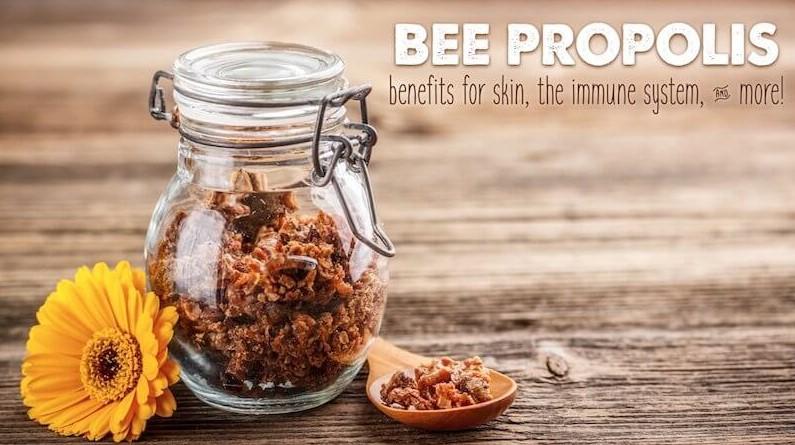How to Differentiate Bee Propolis and Their Benefits

What is Bee Propolis?
Thousands of years ago, ancient civilizations used propolis for its medicinal properties. Greeks used it to treat abscesses. Assyrians put it on wounds and tumours to fight infection and help the healing process. Egyptians used it to embalm mummies.
What is propolis? It is a compound produced by Bees from the sap on needle-leaved trees or evergreens. When they combine the sap with their own discharges and beeswax, they create a sticky, greenish-brown product used as a coating to build their hives. This is propolis.
The composition of propolis can vary depending on the location of the bees and what trees and flowers they have access to. For example, propolis from Europe won’t have the same chemical makeup as propolis from Brazil.
Healing Compounds in Bee Propolis
Researchers have identified more than 300 compounds in propolis. The majority of these compounds are forms of polyphenols. Polyphenols are antioxidants that fight disease and damage in the body.
Specifically, propolis contains the polyphenols called flavonoids. Flavonoids are produced in plants as a form of protection. They’re commonly found in foods thought to have antioxidant properties, including fruits, green tea, vegetables and red wine.

What the Research Found
Bee propolis is thought to have antibacterial, antiviral, antifungal, and anti-inflammatory properties. But scientific research on propolis is limited. Researchers aren’t exactly sure why, but the bee product appears to provide protection from some bacteria, viruses, and fungi.*
- Wounds:
Bee propolis has a special compound called pinocembrin, a flavonoid that acts as an antifungal. These anti-inflammatory and antimicrobial properties make propolis helpful in wound healing. One study found that propolis can help people who have had traumatic burns heal faster by speeding up new healthy cell growth.*
Another study claims that a topical propolis alcoholic extract was more effective than a steroid cream in reducing mast cells in oral surgery wounds. Mast cells are associated with inflammation and slowed wound healing.*
- Cold sores and genital herpes:
Ointments that contain 3% bee propolis, such as Herstat or Cold sore-FX, may help speed healing time and reduce symptoms in both cold sores and sores from genital herpes.*
A study claims that when topical propolis was applied three times a day, it helped to heal cold sores faster than no treatment. The researchers found the propolis cream not only reduced the amount of herpes virus present in a person’s body, but also protected the body against future cold sore breakouts.*
What is the difference between Wax Free (WF) 40, WF60, WF80, and Spray?
Wax Free 40 means that 40% of the product is propolis and its wax-free. Wax Free 40 was specially developed to serve customers seeking a differentiated high quality product, Wax Free and Alcohol Free, either by restricting medical, religious or trade policy in some countries.
Wax Free 60 means that 60% of the product is propolis and its wax-free. Wax Free 60 are obtained through a last generation process of wax removing, through filters at different temperatures, where the main components of Propolis are preserved, keeping a high concentration formula, extracting the waxes and the resins that stick in the cup, the mouth or teeth.
Wax Free 80 means that 80% of the product is propolis and its wax-free. Wax Free 80 is an exclusive formula created to attend the most demanding consumer, Propolis Extract Polenectar™ Wax Free 80 has on its composition a superior concentration of Propolis when compared to other Propolis Extracts.
Propolis extract Spray is the result of combining the noblest Propolis Extract Polenectar™, made mainly with "GREEN" Propolis, and the tastiest Bee Honey, not containing any preservatives or chemical additives such as flavorings or colorings.
What is Red Bee Propolis?
The Brazilian Red Bee Propolis offers the highest diversity of flavonoids among all existing types of world propolis. Key nutrients like pterocarpans, flavanones, isoflavones, chalcones, isoflavones, lignans, and isoflavonoids are all found in this product.
This is the most exotic and premium bee propolis of the world and the only type of bee propolis to offer an exclusive combination of isoflavones and lignans. These special classes of flavonoids promote a natural hormonal balance in the human body.*
Shop Our Bee Propolis Collection
*Please note: these statements have not been evaluated by the FDA. This product is not intended to diagnose, treat, cure or prevent any disease. This product cannot replace your doctor’s prescription medicine.


